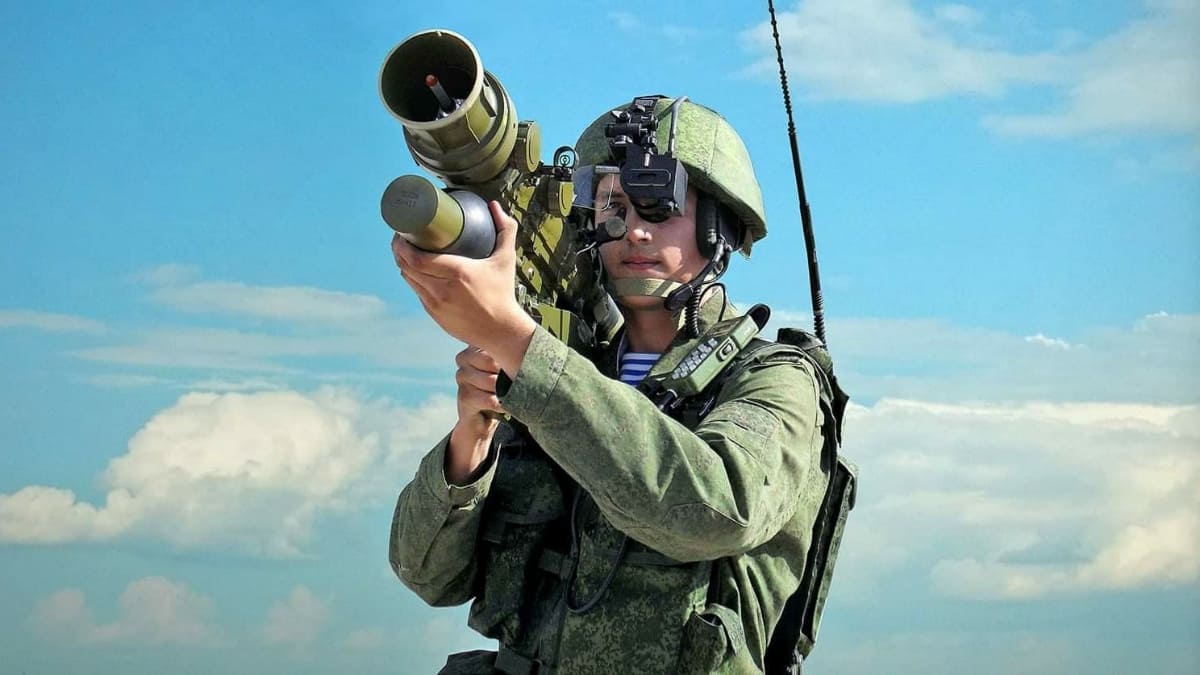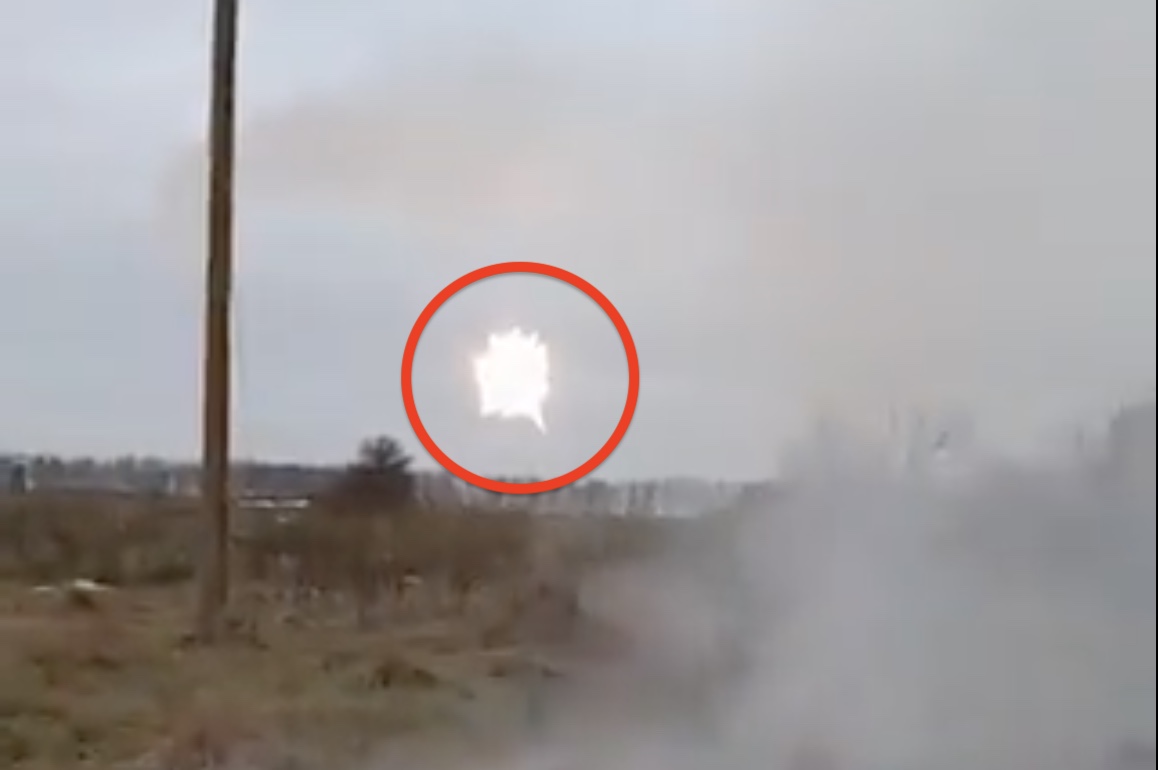A spectacular video has surfaced online showing a Ukrainian soldier shooting down a low-lying Russian cruise missile using the Soviet-origin Igla-S Man-Portable Air Defense Systems (MANPADS).
The Russian military carried out yet another large-scale missile and drone offensive in cities across Ukraine on December 29.
The Ukrainian Air Force said Russia attacked the country from “various directions with air and sea-based cruise missiles” while adding that several kamikaze drones had also been used.
As per the estimate by the Ukrainian military, the Russian military fired 69 missiles across Ukraine, and the Ukrainian Air defense forces intercepted 54 of them.
Some of these missiles were intercepted using MANPADS, and at least one such instance has been filmed on camera, with its video doing the rounds on social media.
The video purportedly shows a low-flying Kh-101/Kh-55 air-launched cruise missile being intercepted by Ukrainian air defense personnel using the Igla MANPADS.
#Ukraine: Another Russian cruise missile (Kh-101/Kh-55) was shot down by Ukrainian 9K38 Igla MANPADS operators today. Two 9M39 missiles are fired, with one striking the target. pic.twitter.com/5MS92CFiTx
— ?? Ukraine Weapons Tracker (@UAWeapons) December 29, 2022
Igla is a man-portable anti-aircraft missile system designed to engage low-flying fixed- and rotary-winged aircraft, unmanned aerial vehicles, and cruise missiles flying at a range of 500 to 6000 meters and an altitude of 10 to 3500 kilometers.
The system includes the 9М39 rocket, 9P39 launching tube, 9P516 trigger with 1L14 built-in ground radar interrogator, and 1L110 portable electronic tablet.

The missile was detected visually by a group of Ukrainian air defense personnel deployed in the zone of the flight of the missile, following which one of them fired on the missile from Igla MANPADS.
The 9М39 is equipped with an infrared seeker, which could have tracked the thermal trail and hit the cruise missile. A massive explosion is observed soon after, apparently only a few hundred meters above the ground.
A huge fireball was formed in the sky, probably about ten meters in diameter.

What is notable, though, is the height of the Russian cruise missile. Such low-flying missiles must be near-impossible to hit for even the most advanced Western-supplied air defense systems being fielded by Ukraine. Therefore, the MANPADS are best suited to intercept such low-flying targets effectively.
The Soviet-origin 9K38 Igla (NATO Designation: SA-24) is used by both Ukrainian and Russian forces in the ongoing Ukraine war.
Russia’s Commander-in-Chief of the Ground Forces, Oleg Salyukov, said in September that one-third of Ukrainian fighter jets were shot down using Igla-S and Verba MANPADS.
As EurAsian Times reported earlier, MANPADS have been significantly used in the ongoing conflict, particularly by the Ukrainian forces.
Since the onset of the war in February, thousands of MANPADS of different types from several countries have been supplied to the Ukrainian forces, with more on their way.
Not The First Time
This is not the first instance of a cruise missile being intercepted by the Ukrainian forces using MANPADS.
In October, two separate instances of Ukrainian air defense units intercepting Russian cruise missiles using MANPADS were reported.
During the two days of a similar large-scale missile attack by Russia on October 10 and 11, Ukrainian air defense personnel from the Southern Air Command reportedly destroyed four cruise missiles using Igla MANPADS, as per the Telegram post by Ukrainian Air Force.
Yaroslav, warrior of the Anti-aircraft Missile Brigade named after Hetman Pylyp Orlyk of the "South" Air Command shot down FOUR ?? cruise missiles from Igla MANPADS during two days of massive missile attack on Ukraine on October 10 and 11. pic.twitter.com/aMeixHk0zU
— Verkhovna Rada of Ukraine – Ukrainian Parliament (@ua_parliament) October 15, 2022
Also, another Ukrainian soldier named Dmytro Shumskyi is said to have destroyed two Russian cruise missiles on October 10, using the Stinger MANPADS. President Zelensky commended Shumskyi in his evening speech on October 11.
“At the request of the military command, I want to celebrate soldier Dmytro Shumskyi (anti-aircraft missile platoon of the 57th separate radio engineering battalion, Chernihiv direction) for yesterday,” said Zelensky.
Dmytro Shumskyi shot down two Russian cruise missiles on 10th October from a Stinger MANPAD in Chernihiv region.
His achievement was praised by President Zelenskyy in his daily address.
Dmytro says, "We keep working, we keep shooting".
Glory to Hero!
?: suspilne pic.twitter.com/U2XAW6UfaM
— Anton Gerashchenko (@Gerashchenko_en) October 20, 2022
The FIM-92 Stinger is a shoulder-fired infrared homing surface-to-air missile developed in the late 1970s. It was designed by General Dynamics and manufactured by Raytheon Missile Systems.
It uses infrared homing and has an operational range of eight kilometers. It can engage fast, low-altitude enemy threats, such as ground attack aircraft at up to 3,800 meters (12,500 feet). In particular, the Stingers are highly lethal against helicopters and transport aircraft.
The US government has committed to providing Ukraine with over 1,400 Stinger anti-aircraft systems.
- Contact the author at tanmaykadam700@gmail.com
- Follow EurAsian Times on Google News




